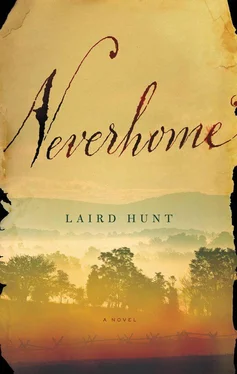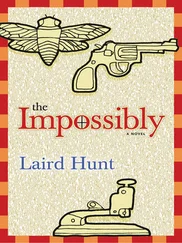You said maybe. It’s only forever if you don’t come home.

You think you are never going to get back and then you are there and you wonder if you were ever gone. The camp was still the camp. Beside the pond-bathing activities, there were boys fighting over hardtack biscuits and having wrestling contests in a leg-churned pool of mud. A mule got loose while I was walking by it, and I spent an hour at catching him with a gang of fellows had their shirts off against the afternoon sun. What a picture it would have made could I have joined in.
After the sun there was a cold rain and I discovered my corner of the tent had sprung a hole and spent some wet minutes in plugging it. During this storm a first lieutenant got caught with three helper women in his lean-to and was made to wear a barrel proclaiming the extent of his moral turpitude. Some of the boys who had robbed the sutler had been hung up under a beech tree by their thumbs. I barely got my eyes on either one of the Akron boys over those next days. You would have thought those tricks out in the woods hadn’t happened. The lieutenant spent a fair portion of his time wearing that barrel with tears in his eyes. The boys had been hung up by their thumbs were let down. I started to write Bartholomew about what had happened in the woods and ended up describing that lieutenant, how he cried and cried for shame. I used another page to write down my thoughts about being back home in our kitchen, about giving him his shave, about how sorry for all of it I was.
Two days after I posted that letter I found myself again in the company of our Colonel. He had set up a desk in front of his tent to scribble out his letters and it took him a minute after I’d been announced for him to look up. He showed a little grander and grayer since our morning in the woods, but that must have just been the grand and gray of the afternoon settling down upon him. The weather will do all kinds of things to a man. It will make him look like a burned cinder or a pillar of ice or a pile of tapioca pudding left too long in the sun.
“Gallant Ash,” the Colonel said, looking up at last. I had expected the travails of the war would have chased that sobriquet out of his mind but there as elsewhere I was wrong.
“I have two things to discuss with you,” he said. “But first I want to ask you a question. Would that be all right?”
“Yes, sir,” I said. For what else would you say to your Colonel?
“Have you ever met a man who was afraid to step out of doors?”
“Depends on if stepping out of doors meant getting fired upon, sir,” I said. “Or getting cavalry-charged. I have stood fairly regular on the line next to men afraid of stepping out of doors and getting cavalry-charged.”
The Colonel looked at me nice and long.
“Are you afraid of stepping out of doors under such circumstances, Gallant Ash?”
“I would be a liar if I said I wasn’t.”
“But you do it.”
“Every day I have to. Just like all your men.”
“Not all my men.”
“Most, sir.”
“Fair enough, Gallant Ash. Let’s call it most. Most isn’t bad. Most is always about the best we can hope for.”
“So we aren’t talking here about de facto all your men.”
He laughed and I wondered if we had had our discussion now or hadn’t. I did not like the way I was feeling standing there, and apparently we had not.
“I have a man in my company can’t stand it to step outside. Has a good address in Yellow Springs, Ohio, and hadn’t left it in five years before he took up the call to arms. Not even to sniff at the spring air. I know the village of Yellow Springs and the spring air there is fine. This man didn’t want it even if it came in through the filter of his curtain. Claimed it burned him. Now he stands alongside you on the lines. I have watched him in battle and he does not flinch nor will he follow his fellows and hide behind fence or rock or tree.”
“Why won’t he?”
“Because it is not bullets he is afraid of. He is afraid of the sun, the earth, the air, the all of it, the sky.”
“I don’t know the man.”
“He is a close relation. My cousin.”
“In the infantry?”
“He refused a commission.”
“Why did he sign up at all?”
“Why did you, Gallant Ash?”
“Sir?”
“We have already discussed the loyalty of your heart and it is not a question that requires answering. I have had my eye on you since your tree-climbing exploit. I have seen how you can make a squirrel hurt. I am also aware of your recent adventure. I don’t know and don’t want to know how you got taken in the first place. I can chalk that up to rebel wiles. Were they wily, the outlaw rebel fucks who took you unawares, Gallant Ash?”
I did not answer his question. Just stared straight over his shoulder at the cot he had in his tent.
“All right,” he said. “I’d not answer that either. Especially not as it included a vulgarity I lately find myself admitting too frequently into my discourse. Today I pose questions that deepen silence, rather than conclude it. That is the province of literature, not leadership. Aurelius knew this. I’ve just had Long’s new version lent to me. Long is no fool. His Aurelius will serve our warring times. ‘Do wrong to thyself, do wrong to thyself, my soul.’ ”
The Colonel turned and took up a book had been lying at the foot of his cot. He opened it up to a page marked with a strip of purple leather and read to me. You ask me how I remember it these years later. I do not know.

“How quickly all things disappear, in the universe the bodies themselves, but in time the remembrance of them; what is the nature of all sensible things, and particularly those which attract with the bait of pleasure or terrify by pain, or are noised abroad by vapoury fame.”

The Colonel nodded and set the book back on his bed. “My interest,” he said, turning to me, “lies not in your motivation for service, for service is its own great answer, but rather in how neatly you extricated yourself and your fellows from that mess.”
“It was all three of us got out together.”
“Your gallantry exceeds you. I have seen and spoken to those two men. They are greenhorns and barely out of the nursery and I exercise the hyperbolic arts in referring to them as men. They would both be better as bootblacks. It is a shame of our days and all days of war that we set our children to arms. One of them cried as he spoke to me.”
“Like the lieutenant.”
“Pardon me?”
“He cried. In his barrel.”
“He has been demoted and sent to fight on elsewhere. Carousing was not his central transgression.”
“I didn’t do anything special, sir.”
“All right.”
“It was three of us got in and three of us got out.”
“Fine, fine.”
The Colonel lit a cigar. He put it in his mouth and took it back out. The smoke came over to me and set a cloud between us.
“I’d had it in mind after your performance with those squirrels to make you a sharpshooter,” he said.
“I wouldn’t want to be a sharpshooter,” I said.
“No, perhaps not, but I’d had it in mind for having seen you in battle and taken account of your exploits and having seen how you barely even had to aim when you shot those tree rats out of their skins. I’d had it in mind to recommend you, in addition, for a citation. For bravery. For that episode with the cartridge boxes. I know about that too. But you hear the tense I am using. You hear that I am speaking in the past.”
Читать дальше














